 09/08/2008 21:57 09/08/2008 21:57 |
|
| | | OFFLINE | | Post: 14.592 | Registrato il: 28/08/2005
| Utente Gold | |
|
Last posts in the preceding page:
Catholicism: a great community with many voices - Editorial commentary in L'Osservatore Romano
issue of 8/9/08, on the Holy Father's colloquium with the clergy of Bolzano-Bressanone. OR also comes publishes full transcript of the Q-and-A.
Benedict XVI's comfort zone - John Thavis of CNS describes the Pope's precedent-setting dialogs with priests.
Posted by Benefan.
The Holy Father's Q-and-A with the priests of Bolzano-Bressanone - A full translation from German/Italian.
* * * * * * * * * * * * * * * * * * * * * * * * * * * * * * * * * * * * * * * * * * * * * * * * * * * * * * * *
 Benedict XVI in Australia:
Benedict XVI in Australia:
At the ends of the earth -
continuing a vital tradition
by Giovanni Maria Vian
Editor, L'Osservatore Romano
Translated from

July 2008
The trip to Australia, like that to the United States, has contributed to show the true Benedict XVI to the world.
Not the mask of the cold and retrograde Grand Inquisitor that the media have for decades imposed on him, but the kindly face, able to show child-like wonder, of a caring and solicitous theologian-pastor .
An intellectual who, as a true pastor, has always intended and known how to explain the essentials of the Christian faith: he did so as a university professor, then as archbishop, then as guardian of Catholic doctrine and principal theological adviser to John Paul II. Now finally, as the successor of the Polish Pope, with whom the same media that has been hostile to him, continues to compare him in an obviously instrumental manner.
Addressing the faithful above all, but also those who have distanced themselves from the Church, the Holy Father uses his habitual clear, cohesive language and thought, in discourses often reported minimally only by the media but which deserve to be read for their richness.
Even this time in Australia, the verdict on the trip has been positive.
The success of Benedict XVI's trips - just as those he undertook as Prefect of the Congregation for the Doctrine of the Faith (with unprecedented intercontinental destinations for him and his then #2 man, Cardinal Tarcisio Bertone, now his Secretary of State) - may be explained by careful preparation .
This time, it involved not only the Catholics of Australia but mobilized the Church on a planetary scale for the celebration of the XXIII World Youth Day. Obviously not an easy undertaking but facilitated by the generous commitment of the Pontifical Council for the Laity and the participation of hundreds of bishops, priests and religious who met and catechized tens of thousands of young people literally hacing come 'to the ends of the earth', to use a Biblical expression appropriate to the Sydney event.
Equally fundamental to the success of the trip was the leadership of the Archbishop of Sydney, Cardinal George Pell, and the generous support of the Australian government under Prime Minister Kevin Rudd, who intervened twice - with a warmth that was beyond protocol - to welcome the Pope as well as the young pilgrims; and who decided to seal the Pope's visit by naming the first resident ambassador fo Australia to the Holy See, Tim Fischer, from the opposition Conservative Party.
In this context, Benedict XVI immediately tackled the most urgent questions on this trip - during an inflight news conference with the newsmen travellling with him to Sydney, as he did on his way to the United States last April: the environment, the plight of Australian aborigines, the scandal over sex offenses by Catholic priests, and above all, spiritual 'desertification'.
These are issues that evidently go beyond the confines of the 'newest' continent, during an event that was truly global. But they provided the Pope with an occasion to repeat with kindly but clear firmness that the contemporary world has a thirst for God, for which Christ and his Church are the answer.
The Pope's long and demanding Australian trip - which Rabbi Jeremy Lawrence of Sydney called a historic event - and World Youth Day 2008 were indeed highly significant, well beyond being a spectacular but isolated episode.
In the body of Benedict XVI's Australian texts, he always goes straight to the core. On Day 1, he pegged the significance of his visit to Australia's efforts to purify its history - Prime Minister Rudd in the past several months has repeatedly apologized for previous governments' policies towards native Australians - but went on to exhort the youth to
On the second day, he focused on Christ as the only Redeemer, in his meetings with representatives of other Christian confessions, of non-Christian religions, and rehabilitating youths. Not by chance, it was the day of a very moving Stations of the Scross through the center of Sydney.
Knowing the Australians' reputation for frankness, Benedict XVI told the Christian leaders it was important to move the ecumenical movement forward - towards celebrating the Eucharist in common - saying doctrinal differences should not be seen as an obstacle.
The centrality of Christ was openly evoked by the Pope even in his very cordial meeting with the representatives of different religions, speaking on religious freedom and the 'harmonious correlation of religion and public life' as being more iomportant in these times, when, in many Wetsern societies, religion is often presented as the cause of divisions.
He said religions should proceed together expecially in the field of education, teaching moderation and attention to the spiritual dimension.
And in his address to the youth in a rehabilitation community, he told them that true life can be fouund only in Christ, and cannot be achieved pursuing 'other gods' such as material goods, possessive love and power.
Attentive to symbols, at the Mass to consecrate a new altar for St. Mary's Cathedral in Sydney, the Pope expressed the hope for a rebuilding of the Australian Church, and at the prayer vigil with the youth, he asked them to oopen their hearts to the Holy Spirit, focus of WYD 2008.
Like the new altar which features a bas-relief of Christ inspired by teh Hoyl Shroud of Turin, Chistians, too, are consecrated, he said - which means, set apart for the Kingdom fo God, in a world which would set God apart.
But consecration to God is demanding, and Benedict XVI once more expressed his shame and displeasure for the cases of sexual abuses committed by priests on minors, in forceful words that left no space for doubts about where he stads. And as he did in the United States, a mmeeting with some victims followed, undertaken most discreetly.
To the Holy Spirit - "in many ways the forgotten 'Person' of the Holy Trinity" - the Pope dedicated a long meditation at the prayer vigil, partly using the catechesis of St. Augustine.
Underscoring to the young people - but speaking to the entire Church - that the Spirit of God is in the life of every human being and draws us to what is real, lasting and true - beyond the limits of everything that is transitory, and far beyond consumerist madness.
At the heart of Benedict XVI's longest apostolic trip so far, then, was the transmission of the faith. Once more, Benedict XVI spared no effort to show the continuity and ever-renewed vitality of the Christian tradition in the global panorama of a spiritual desert that seems to be widening.
To the hundreds of thousands of young people assembled in Sydney - and through them, to all the Church - the Pope posed radical questions: "Are you living your lives in a way that makes room for the Spirit in the middle of a world that ants to forget God, or are you rejecting God outright in the name of a false idea of freedom?",
confident that most of them would respond positively, to contruct "a world in which life is welcomed, respected and protected".
Not only by Christians, but by other believers as well as non-believers.
[Modificato da TERESA BENEDETTA 09/08/2008 23:59] |
|
 09/08/2008 23:43 09/08/2008 23:43 |
|
| | | OFFLINE | | Post: 14.593 | Registrato il: 28/08/2005
| Utente Gold | |
|
 Honorary citizen of Bressanone:
Honorary citizen of Bressanone:
Benedict praises the city
as a model for Europe

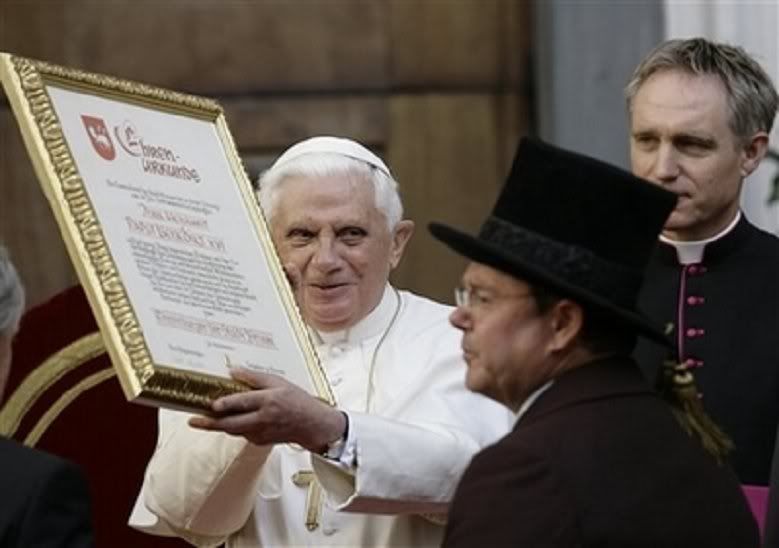
BRESSANONE, August 9 (Translated from Apcom) - The Pope this evening received honorary citizenship in Bressanone where he is spending his vacation.
The certificate, inscribed in German, cites Benedict XVI's contribution to "reciprocal understanding among peoples, religions and cultures".
Benedict XVI then signed the Golden Book of the city of Bressanone, on which the Italian translation of the citation is found alongside the German text.
"Bressanone is a place of encounter among cultures," the Pope said in his extemporaneous remarks afterwards, "represented by the very fact that three languages are spoken here". [The third with German and Italian is Ladino, a Romance language spoken in parts of the Tyrol and southern Switzerland.]
"We know dialog is not always easy, but it can be very fruitful," he added.
In Italian, he said Bressanone is "a model for Europe" in "its happy synthesis of healthy secularity and joyous Catholic faith, of Christian roots and modernity, of past and future - where history does not impede the dynamism of the future but inspires and dynamizes the future."
He said that Christian roots and modernity together "could construct a society that is authentically human."
Benedict XVI, who has spent more of his summer holidays as an adult in Bressanone than in any other place, added: "Here I have written, I have found friends. I have beautiful memories, I have appreciated the beauty of the land and walks through the area. It has been a beautiful respite for me, spiritually and physically."
The ceremony of conferment took place at the Seminario Maggiore, where Benedict XVI and his brother Georg are staying for a summer vacation that ends on Monday, August 11.
The Pope greeted the president of Bolzano province, Luis Duernwalder, with whom he chatted a bit, Bressanone Mayor Albert Puergstaller, Mons. Wilhelm Egger, bishop of Bolzano-Bressanone, and members of the city council.
"I sweated a bit because to make a 'laudatio' for the Pope is not easy," the mayor jested at a news conference afterwards.
Dressed in traditional Tyrolean costume - complete with cylinder hat, high collar and waistcoat, walking stick and Zouave-style knickers, the mayor added: "Benedict XVI is now a citizen of Bressanone for all intents and purposes. If he has any problems, he may come to the citizens' counter at city hall. Joking aside, we hope he will come back in the coming years."
He said he did bring this up to the Pope who answered, "God willing..."
In its issue for Sunday, 8/10/08, the Vatican newspaper has an item that gives a few more details about the last few days of the Pope's summer holiday, which seems to have flown by! The item was entitled 'Consensus of the clergy after the encounter with Benedict XVI', but that part of the story comes at the end, and it only quotes two of the priests who asked questions from the Pope, who were asked their reaction to the Pope's answers.
The Pope's vacation
draws to a close
Translated from
the 8/20/08 issue of

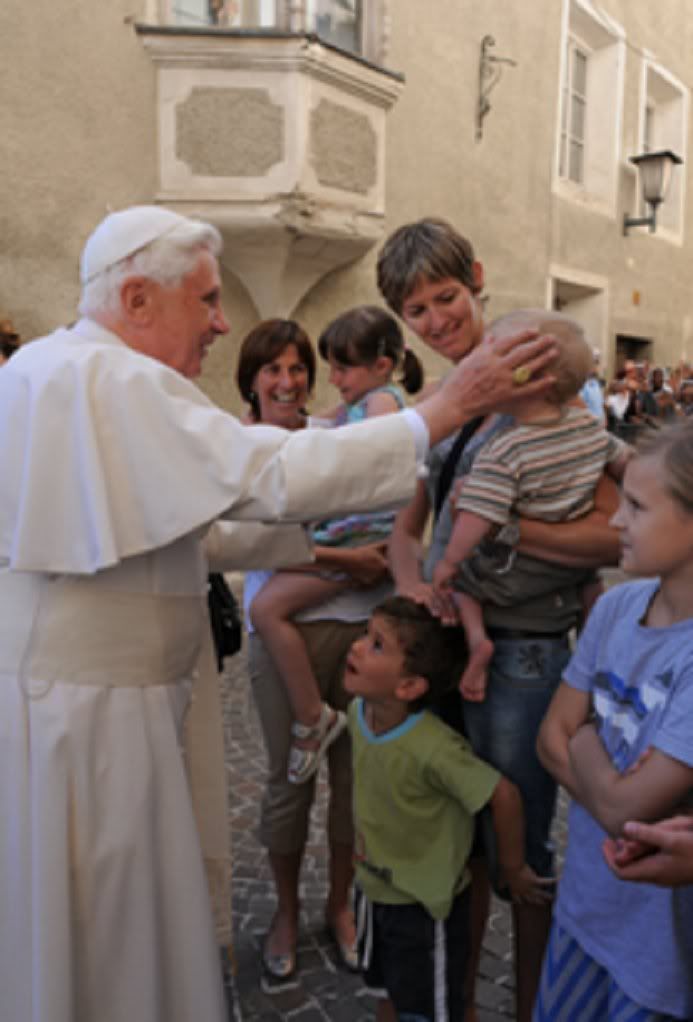
Citizen of the world. Now citizen of Bressanone. Benedict XVI has been inscribed officially with all honors in the citizens' registry of the city.
It was not simply a courtesy rite that took place on Saturday evening at the Seminario Maggiore, but a recognition of the Pope's affection for and long history of links to the city and its people.
Mayor Albert Purgstaller and his entire city council presented the citation of honor to the Pope in the presence of the bishop of Bolzano-Bressanone, Mons. Wilhelm Egger.
"Since the late 1960s," citation reads in part, "he started coming regularly to Bressanone on vacation wtih his brother and sister. His choice to spend his holiday here this year for the first time as Pope proves the profound bond that unites him to our province, the Seminario Maggiore, and the city of Bressanone. It is an expression of affection towards the people who live here, towards the culture and the character of our territory."
It also underscores the luster that the city has earned beause of its association with Benedict XVI. It adds that "the Pope's holiday here constitutes an important stimulus for the local church and implies an invitation to the faithful to actively confront the doctrine of the faith."
The last days of the Pope's vacation have followed the pattern of the past two weeks since he arrived here July 28 - his time spent in prayer, reading, writing and resting.
He has had only three public events so far - the Angelus last Sunday and the visit to Oies on Tuesday, to the birthplace of the only canonized saint from the South Tyrol, St. Joseph Freinademetz; and an encounter with the clergy and religious of the diocese of Bolzano-Bressanone on Thursday.
His only other excursion outside Bressanone was a brief visit last Sunday afternoon to the village of Sant'Andrea outside Bressanone, where he and his brother visited the grave of a missionary friend who died in 2003.
The Pope's only remaining public activity is the Angelus tomorrow at the Cathedral Square. He is scheduled to leave Bressanone for Castel Gandolfo on Monday afternoon.
Saturday morning, he had a visit from the Patriarch of Venice, Cardinal Angelo Scola. Last Thursday, he was visited by former President Francesco Cossiga, who has known him since he was a university professor.
At last Sunday's Angelus, Cardinals Angelo Bagnasco of Genoa and Crescencio Sepe of Naples came to pay their respects to the Pope from the monastery of Pietralba north of Bressanone where they were spending their summer holiday.
[ The article then says something about the Pope's meeting with the clergy and goes on to quote reactions from two of the priests who presented a question to the Pope.]
Canon Karl Golser, who had raised the question of environmental awareness, said: "I was very satisfied with the Pope's answer, especially because he underscored the link between Creation and Redemption and how they are inseparable. Above all, I liked his reference to God the Creator who guarantees the impossiblity that man should exploit the planet as he pleases because we have a responsibility to God himself, that our mandate is to manage and conserve the reources of nature as God wants us to."
Golser said that when the Pope flew from Bfressanone to Oies last Tuesday, he was shown from the air the Marmolada glacier in the Dolomites which has been receding, possibly as a consequence of global climate changes.
Don Willi Fusaro, a Bolzano priest afflicted with multiple sclerosis since 1991, said he was very comforted by the Pope's observations about suffering.
In anticipation of the 8/10 Angelus in Bressanone, here are some overhead shots of the 8/3 Angelus from the photo-gallery of

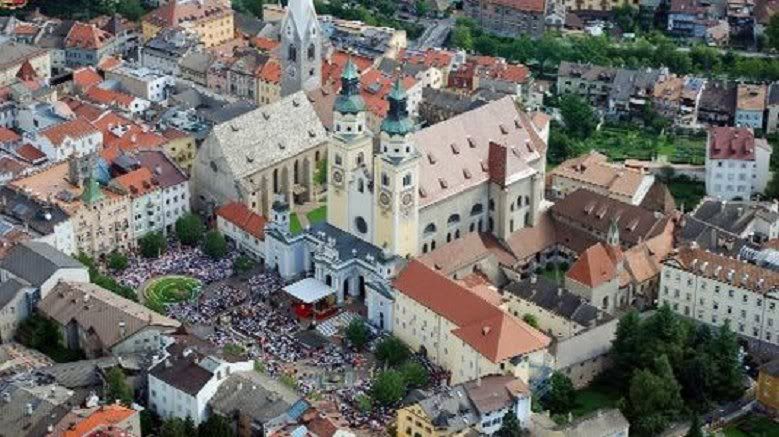
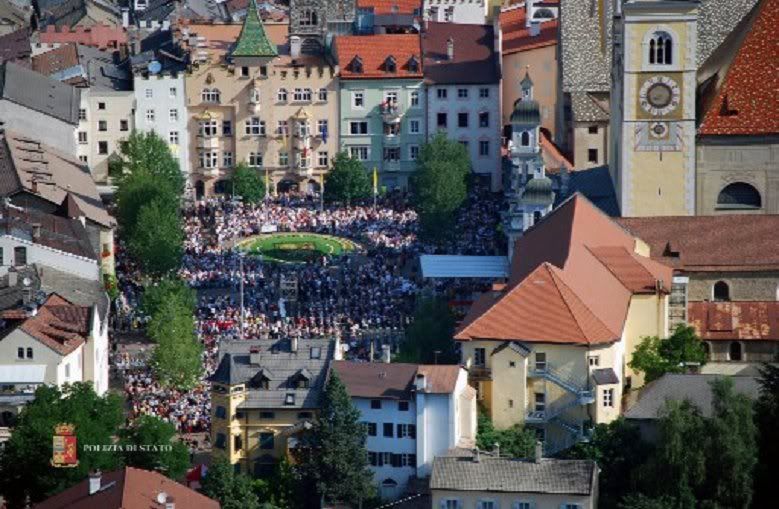
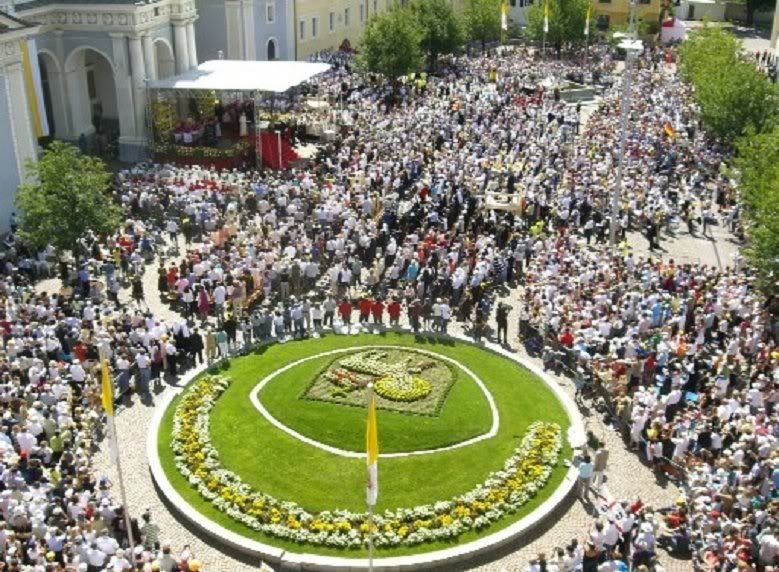 And this picture from 8/3 is from OR:
And this picture from 8/3 is from OR:
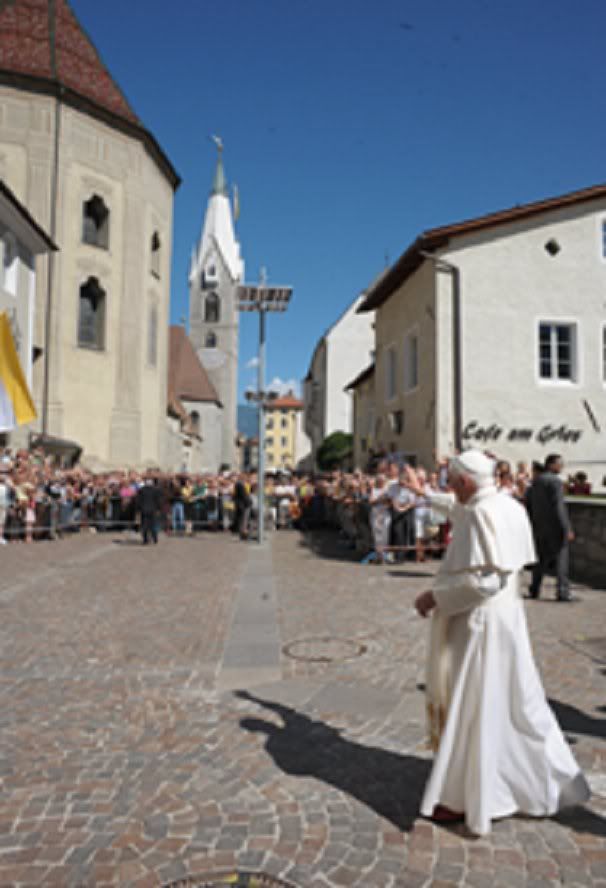
[Modificato da TERESA BENEDETTA 20/08/2008 03:01] |
 10/08/2008 14:02 10/08/2008 14:02 |
|
| | | OFFLINE | | Post: 14.597 | Registrato il: 28/08/2005
| Utente Gold | |
|
 ANGELUS TODAY
ANGELUS TODAY
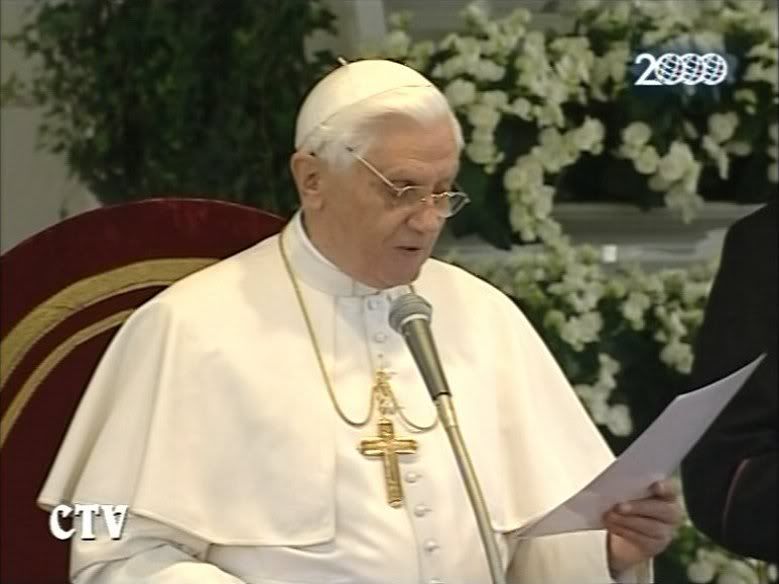 All video-caps courtesy of Monica in the main forum.
Pope urges end
All video-caps courtesy of Monica in the main forum.
Pope urges end
to hostilities in South Ossetia

BRESSANONE, Italy, August 10 (AP) - Pope Benedict XVI has urged an "immediate" end to hostilities in South Ossetia and the start of negotiations between Russia and Georgia over the contested province.
Following a weekly Sunday prayer, Benedict called on all sides to refrain "from further confrontations and violent retaliations that could degenerate into a wider conflict."
The pope urged the international community to "make every effort" to encourage both sides to reach a peaceful solution. He said Roman Catholics were joining Orthodox Christians in praying for such an outcome.
Benedict spoke to a crowd in Bressanone, a town in the Italian Alps where he is spending a two-week vacation.
AsiaNews add this information about the Holy Father's regular Angelus message:
Pope urges young people
to find joy in being together
not in 'vulgar, violent means'

.....
Before the recitation of the Marian prayer, recalling the World Youth Day last month in Sydney, Australia, Benedict XVI he urged young people to discover the "simple joy" of being together, without resorting to "vulgar and violent means, to alcohol and drugs", which often lead to "degrading experiences that, not infrequently, end in terrible tragedy."
He said:
"This is a typical result of the current so-called 'society of well-being', which, in order to fill an interior emptiness and the boredom that accompanies it, leads to experiments with new, more exciting, more 'extreme' experiences.
"In this way, even vacation risks deteriorating into a pointless search for illusory pleasures. But this gives no rest to the spirit, the heart feels no joy and finds no peace, and instead ends up more weary and sad than before.
"I have addressed myself to the young people because they are the ones most thirsty for life and new experiences, and therefore also those most at risk. But the reflection is valid for all: the human person is truly refreshed only in relationship with God, and God is encountered by learning to listen to his voice in interior quiet and in silence (cf. 1 Kings 19:12)".
"Let us pray", he concluded, "that in a society that is always in a hurry, vacation may be a time of true relaxation, during which we may set aside moments for recollection and prayer, which are indispensable for profoundly rediscovering ourselves and others once again".
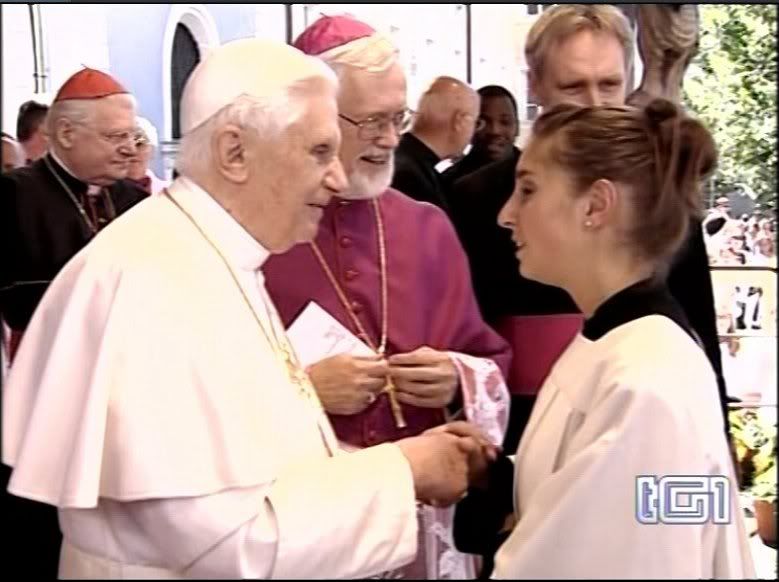 This videocap taken after the Angelus, shows Cardinal Angelo Scola, Patriarch of Venice, in the background, left. This videocap taken after the Angelus, shows Cardinal Angelo Scola, Patriarch of Venice, in the background, left.
This brings to an end the vacation of Benedict XVI [actually, he does not leave Bressanone until tomorrow afternoon to return to Castel Gandolfo for the rest of the summer], who appeared today smiling, relaxed, and rested. Yesterday, he was made an honorary citizen of this town where he came for summer vacation for ten years as a cardinal.
After repeatedly saying goodbye and thanking those present, the Pope also addressed "the journalists and workers in the mass media who have followed me during this vacation. I thank you, dear friends", he told them, "for your work, and I assure you of my prayers for your personal and professional intentions".
The Vatican has posted the text of the Pope's appeal on Ossetia but not the rest of his words at Angelus today. Here is a translation:
At the noonday Angelus today in Bressanone's Piazza Duomo (Cathedral Square), the Holy Father made an appeal regarding the situation in South Ossetia [separatist region in the former Soviet republic of Georgia].
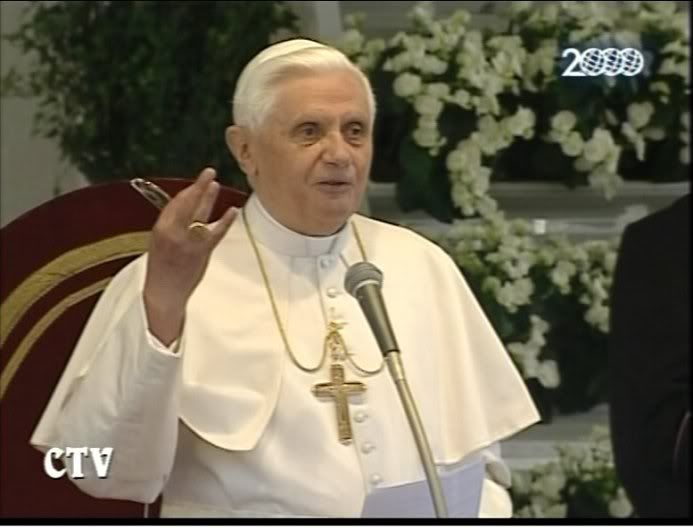 THE HOLY FATHER'S APPEAL
THE HOLY FATHER'S APPEAL
Dear brothers and sisters,
Reason for profound anguish is the news, increasingly dramatic, of tragic events happening in Georgia, which have already resulted in many innocent victims in the region of South Ossetia and forced a great number of civilians to leave their homes.
It is my most sincere hope that military actions may cease immediately and - in the name of a common Christian heritage - for all parties involved to abstain from further confrontations and violent retaliations which could degenerate into a more serious conflict; rather, to resolutely follow the path of negotiation with respectful and constructive dialog, thus avoiding further suffering for the dear peoples of the region.
Among other things, I call on the international community and to the countries that can most influence the present situation to do everything to sustain and promote initiatives towards a peaceful lasting solution in favor of open and respectful coexistence.
Together with our Orthodox brothers, let us pray intensely for these intentions, and entrust them with confidence to the intercession of the Most Holy Virgin Mary, Mother of Jesus and of all Christians.
Today's issue of L'Osservatore Romano carried this item:
Benedict XVI's concern
about the fighting in Ossetia
Translated from
the 8/10/08 issue of

TBILISI, Georgia, August 9 - Fighting between the armed forces of Georgia and the separatists of the Georgian province of South Ossetia has turned in the past few hours into a bloody war between Georgia and Russia.
The conflict - Moscow says some 1600 have died so far, but Tbuilisi denies this - risks becoming the powderkeg of the Caucasus.
The Georgian president, Miikhail Saakashvili, has proclaimed a 'state of war', accusing Russia of having bombarded several Georgian cities.
Saakhasvili has called for an immediate ceasefire. The Georgian Parliament unanimously approved the presidential decree on a state of war and introduced martial law over the whole land for 15 days starting today.
Fr. Federico Lombardi, Vaticna press director, said on Vatican Radio that the Pope is following the tragic news "with great concern".
"Unfortunately," he said, "we are all affected by these events. War, violence and death - even when we do not yet know precisely the number of victims - cause great sorrow and concern. The Caucasus is one of those regions where there are many tensions that could come to light at any time after years of apparent calm. This is a moment of great concern."
"We hope that reason and a will for peace and negotiations may prevail over the use of arms, which are never the best way to build the peace."
[Modificato da TERESA BENEDETTA 10/08/2008 15:35] |
 10/08/2008 14:59 10/08/2008 14:59 |
|
| | | OFFLINE | Post: 3.258 | Registrato il: 23/11/2005
| Utente Master | |
|
Benedict fondly recalls 'noisy' WYD
Sydney Morning Herald
August 10, 2008 - 10:21PM
Pope Benedict XVI says he's had time to reflect on the "sometimes noisy" but joyful experience of last month's World Youth Day in Sydney while on holiday in the Italian Alps.
The pontiff was speaking at the end of his 10-day holiday before some 9,000 people who packed a square in front of the cathedral of the north-eastern Italian town of Bressanone for the Sunday noon Angelus prayer.
The 81-year-old Benedict said his holiday had allowed him to reflect on his meetings in Sydney with young people from all over the world and how their experience contrasted with the "false escapism" of many peers who indulge in violence, alcohol and drug abuse.
"In the great metropolis of the young Australian nation those young people were a sign of authentic joy, sometimes noisy, but always peaceful and positive," Benedict said.
"Despite their large number, they did not cause disorder or any damage. To have fun they did not need to engage in raucous or violent acts, nor rely on alcohol and drugs," Benedict said.
"How can one not contrast them to their peers who, searching for false escapism, consume degrading experiences that sometimes result in tragedy," Benedict said.
Touching on a recurrent theme of his papacy, Benedict blamed so-called modern "prosperous society" for offering young people empty values and boredom which he said tempted them to seek new "extreme" experiences.
"In this way the spirit does not rest, the heart does not experience joy, but in fact ends up being more exhausted and sad than before," Benedict said.
"Let's pray that in a society which is always moving faster, vacations may be days of relax(ation) during which we can find moments for prayer and time to find ourselves and others," Benedict said.
Benedict is scheduled to return to the papal summer residence in Castel Gandolfo near Rome.
|
 10/08/2008 16:07 10/08/2008 16:07 |
|
| | | OFFLINE | | Post: 14.598 | Registrato il: 28/08/2005
| Utente Gold | |
|
 Saying goodbye to Bressanone:
Saying goodbye to Bressanone:
'Here, I have been able to enjoy
a salutary detachment'

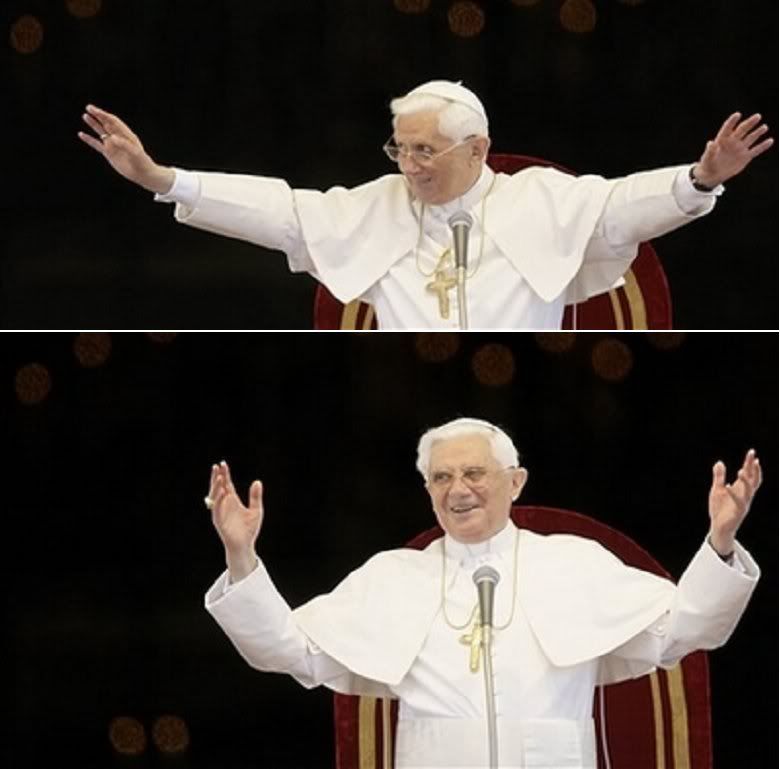
BRESSANONE, August 10 (Translated from Apcom) - Pope Benedict XVI said today he has been able to enjoy a 'salutary detachment' during his 15-day holiday here which ends tomorrow.
Speaking to some 9,000 pilgrims gathered in the city's Piazza Duomo (Cathedral Square) for the second Sunday Angelus of his holiday, the Pope said in German:
"It is almost time for me to leave this beautiful land, where I have felt at home, both for the familiarity of these places and for the hospitality of its people.
"I am grateful to the Lord that he has granted me this break which has been very restorative physically and spiritually. I have been able to rest in the way best indicated for a minister of God - devoting my time to prayer, reading and meditation, without being constantly worried by daily pastoral concerns.
"I do not mean that I have forgotten them, of course, but that I have been able, so to speak, to filter them through a salutary detachment which helps to put them in the right perspective - to recognize that God is the Lord, and we are only his humble collaborators in the service of the Church and for the good of mankind."
Among the dignitaries attending today's Angelus were former Italian President Francesco Cossiga; Economic Minister Giulio Tremonti; Cardinal Angelo Scola of Venice; Archbishop Claudio Maria Celli, president of the Pontifical Council for Social Communications; and Cardinal Achille Silvestrini.
Tomorrow afternoon, the Pope returns to the papal summer residence in Castel Gandolfo for the rest of the summer.
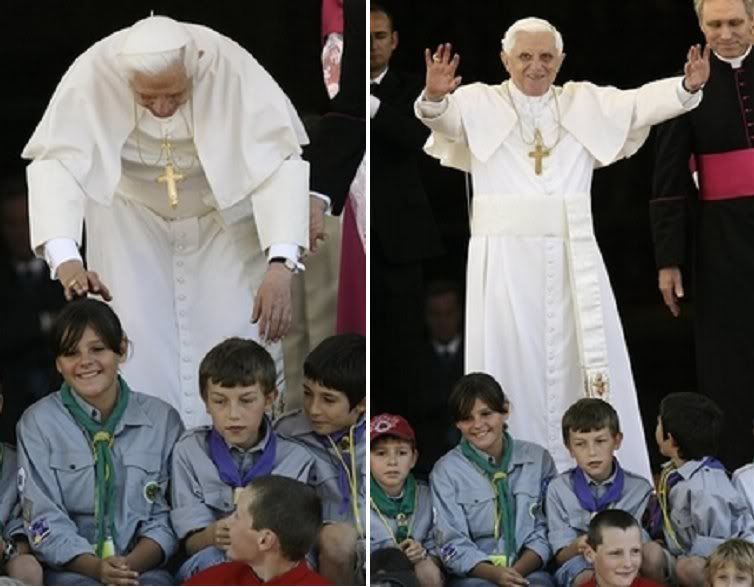 How many 81-year-olds can bend so gracefully - or even think of bending this way?
How many 81-year-olds can bend so gracefully - or even think of bending this way?
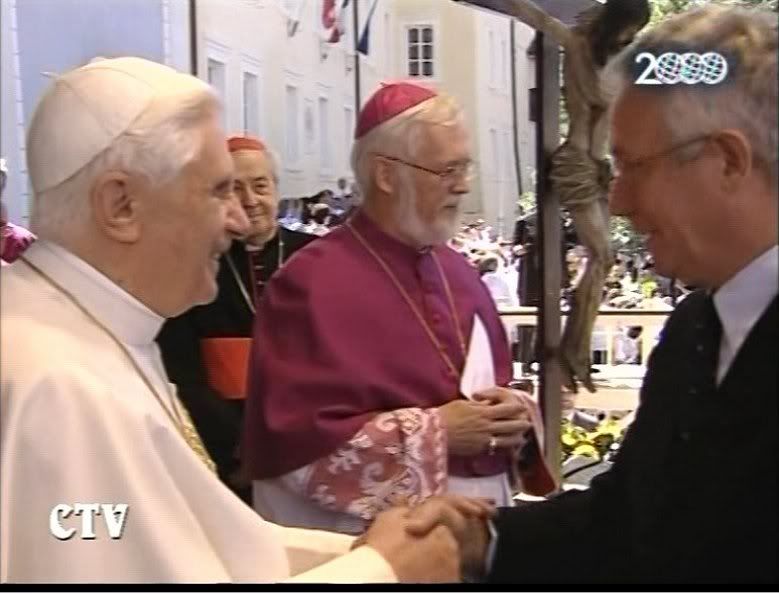
 The Vatican press office has once again failed to post the full text of the Holy Father's words at the Angelus in a timely manner - all it has released so far is what he said about the Ossetia situation. Typically, only Vatican Radio has reported on the Pope's actual homily today - the one based on today's Gospel.
Lesson from today's Gospel
Translated from the
The Vatican press office has once again failed to post the full text of the Holy Father's words at the Angelus in a timely manner - all it has released so far is what he said about the Ossetia situation. Typically, only Vatican Radio has reported on the Pope's actual homily today - the one based on today's Gospel.
Lesson from today's Gospel
Translated from the
Italian service of
 
[ The report begins with the Pope's statements on Ossetia, which he gave after the Angelus prayer. Before the prayer, he started with this:.]
The Pope, speaking first in German, underscored the benefits of taking time off for rest in recalling that the Gospel today "takes us from the place of rest to daily life".
"It tells us," he said, "how, after the multiplication of loaves, the Lord went up the mountain to be alone with the Father. Meanwhile, the disciples were on the lake, and with their poor little boat, tried in vain to hold up against a contrary wind."
Even today, the Pope said, "in many parts of the earth, the Church is trying hard to get ahead despite contrary winds and it may seem that the Lord is far away, but the Gospel gives us a response of comfort and encouragement even as it shows us the way."
Christ holds out his hand to us, he said, as he did to the disciples, "and only if we take his hand, if we allow outselves to be led by him, can our way be right and good."
"Because of this, let us pray to him," he said,"that we may always succeed in finding his hand, and at the same time, let us pray that in his name, we may be able to hold out our hand to others, to those who need a hand to lead them into the waters of our history."
[ The Pope then proceeds to talk about the recent WYD and the lessons he reiterates for young people.]
 You may watch videoclips of the Pope in Bressanone - now including today's Angelus and the conferment of honorary citizenship yesterday -on the Vatican's Videonews on Demand:
www.radiovaticana.org/it1/videonews_ita.asp
You may watch videoclips of the Pope in Bressanone - now including today's Angelus and the conferment of honorary citizenship yesterday -on the Vatican's Videonews on Demand:
www.radiovaticana.org/it1/videonews_ita.asp
8/11/08
The full translation of the Pope's words at Angelus has been posted in AUDIENCE & ANGELUS TEXTS.
[Modificato da TERESA BENEDETTA 11/08/2008 13:44] |
 11/08/2008 21:14 11/08/2008 21:14 |
|
| | | OFFLINE | | Post: 14.610 | Registrato il: 28/08/2005
| Utente Gold | |
|

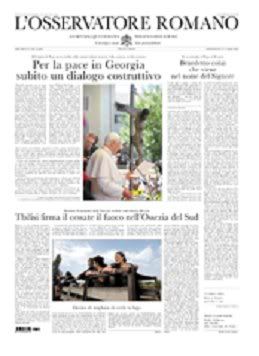
The August 11-12 issue of L'Osservatore Romano
features the Holy Father's message calling for
a peaceful resolution of the conflict in Georgia
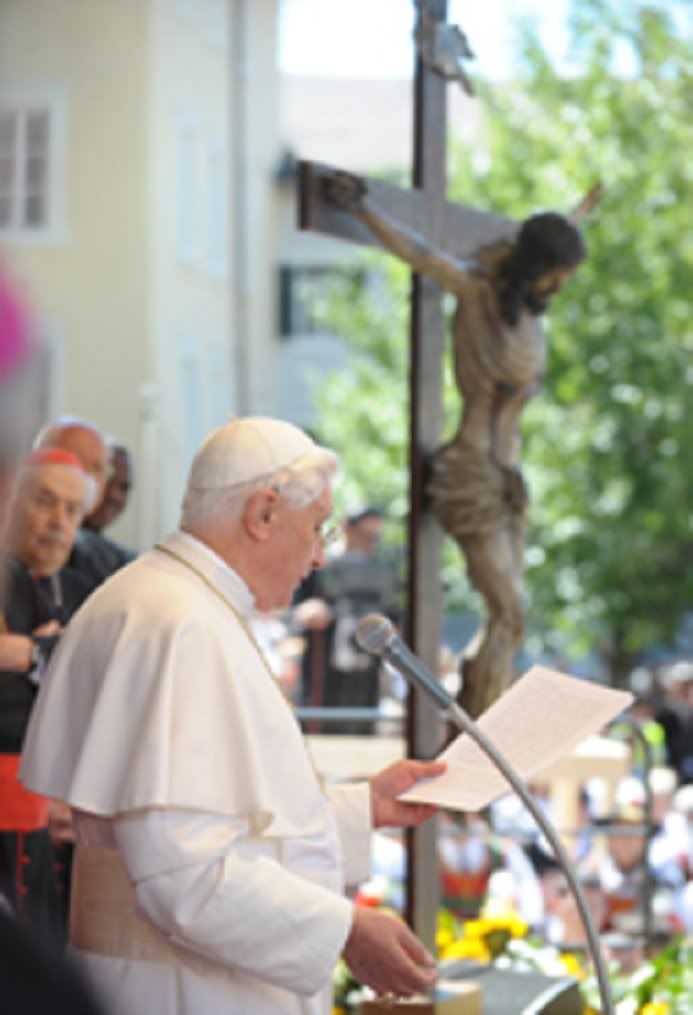
The issue contaisn the full text of the Holy Father's Angelus messages, as well as his extemporaneous remarks at the ceremony at which he was conferred honorary citizenship by the city of Bressanone, translated below:
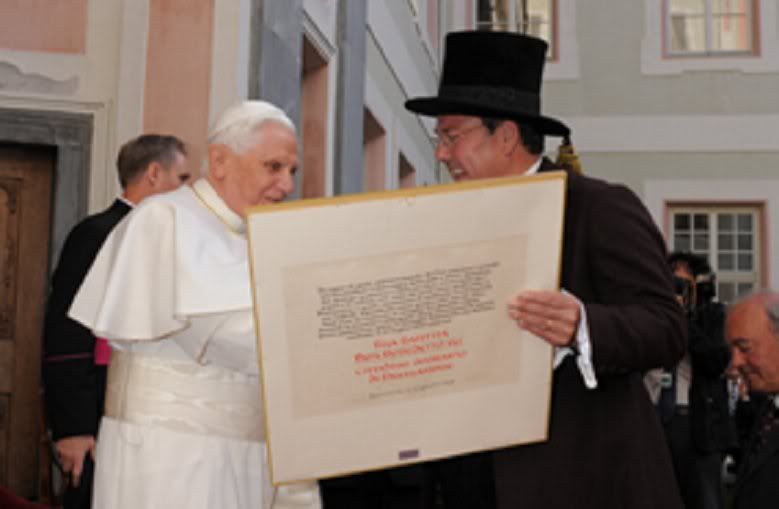
REMARKS OF THE HOLY FATHER
AT CONFERMENT OF HONORARY CITIZENSHIP
He began in German -
Excellency, Mr. Regional President, Mr. Mayor,
Members of the City Council, Ladies and Gentlemen,
Dear Friends!
The honor given me by the city of Brixen through the conferment of honorary citizenship is a great joy for me, which I accept with heartfelt thanks and which will accompany me for the rest of my life.
Thus, I am no longer just at home in Brixen 'in my heart' but also legally, and now belong to its citizenry. So even when I will not be able to come here in person, I would always be legally here.
That I am often here in my heart, I do not really need to tell you. My most heartfelt thanks! Also to the choir who have confirmed and transformed to reality the beautiful words they sang.
When, in the past, I would come from the north, travelling on the Brenner highway towards Brixen, it was always a moving moment for me to come into the valley when the towers of Brixen first become visible - this city, surrounded by vineyards and orchards, nestled between the mountains, full of history and beauty.
Then I would know: this is a good place to be! Then I would know that I had chosen the right place, and that from here I could return to my tasks with new strength.
In Brixen, as has been pointed out, I have written a great part of my books, but here I have also relaxed, I have found friends, and above all, I have acquired memories to carry with me.
And this is a beautiful thing - that I can wander through Brixen in the landscape of memories, and therefore when I am back in Rome, I can always walk through Brixen in my memories and be here again to relax and to be restored.
Above all, Brixen has become important to me - as you, Mr. Mayor has so beautifully and profoundly presented it - as a place of encounter, of the encounter of cultures. In three languages - Italian, German and Ladino - different cultures meet here, and such an encounter of cultures, which we need so much today, has a history in Brixen.
We know that it is not always easy but it is always fruitful and rewarding, that it helps us all and makes us richer, more open and more human.
He switches to Italian:
Bressanone is for me a place of encounters: en encounter of cultures; an encounter between healthy secularity and a joyous Catholic faith; between a great history and the present as well as the future. We see that this history, which is rvery much present and tangible here, is not an obstacle to formation, to dynamisn, to the vitality of the present and the future; on the contrary, it inspires and dynamizes.
It is also an encounter between Christian roots and the spirit of modernity, which only together can construct a society truly worthy of the name, of a truly human society.
He concludes in German:
For me, Brixen is in this sense a European model, a truly European city, with Christian roots and a Christian identity, which do not imprison us. On the contrary, they make us open to others, they enable us to have communion in encounter, and give us the standards and the values to live by.
My hearfelt thanks goes to all of you, and I wish you all God's blessing. May the Lord continue to protect this beautiful city and help her to build a great, beautiful and human future. Many thanks!
The site of the city of Bressanone has some more pictures of the event:
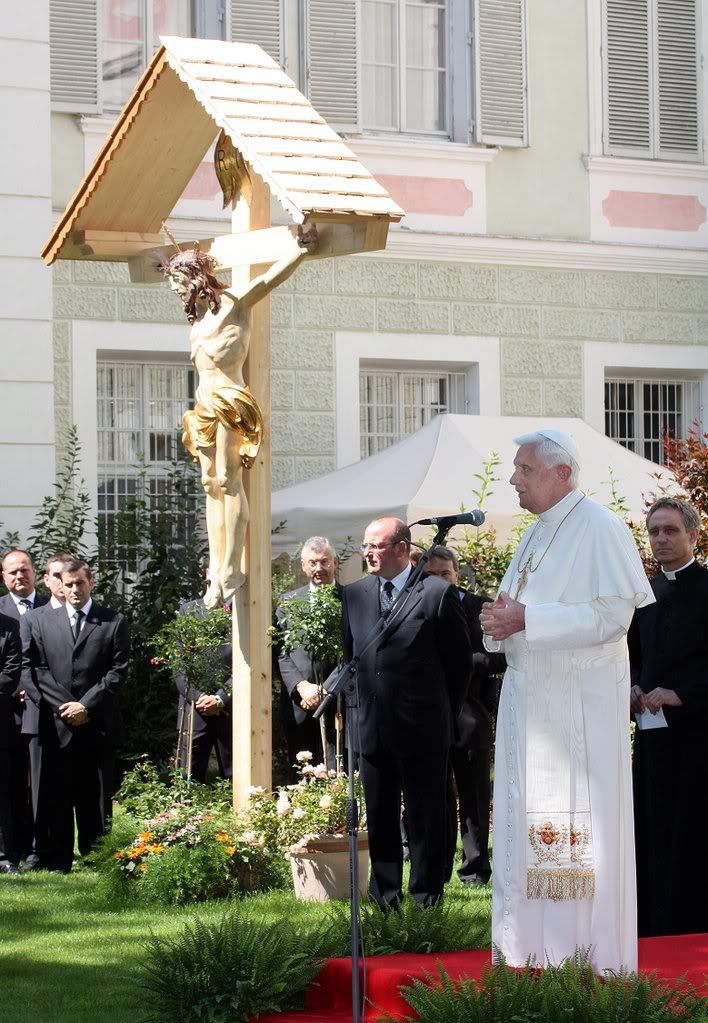
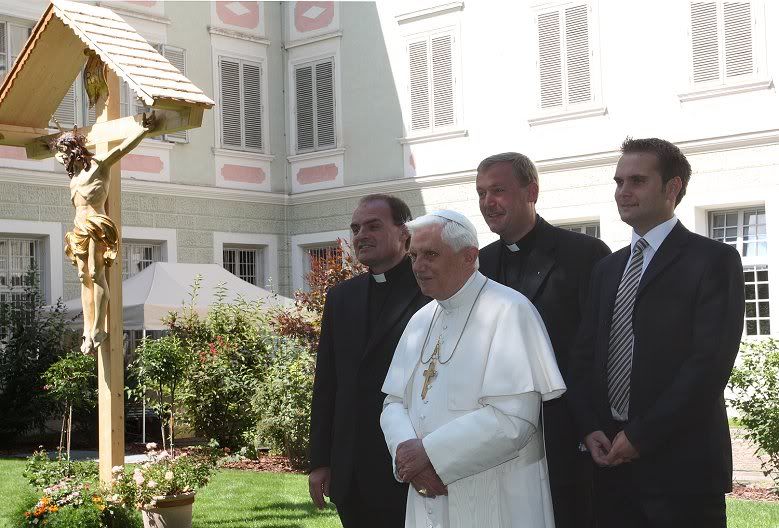
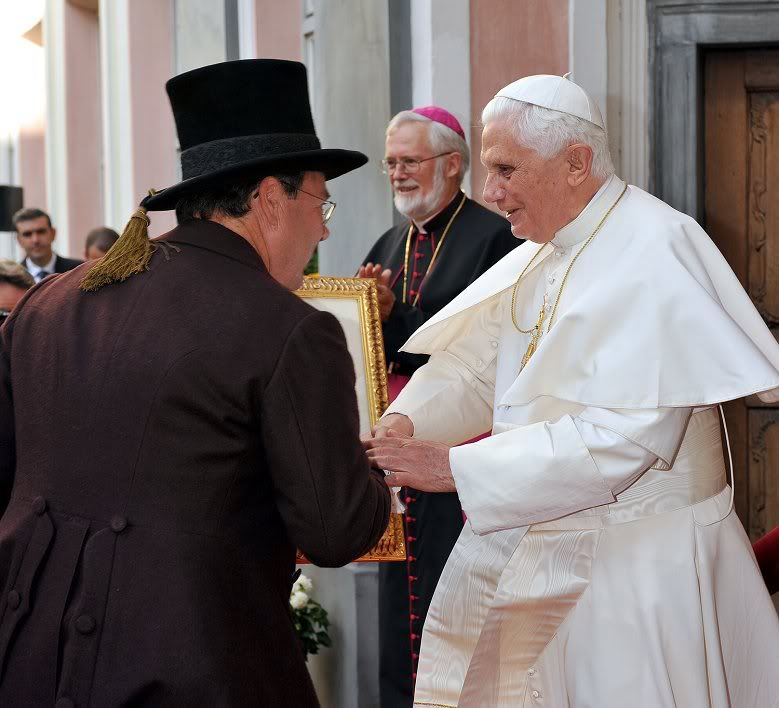

And this was the front page today (8/11) of ALTO ADIGE, which gave prominent play to the Pope's message on peace.
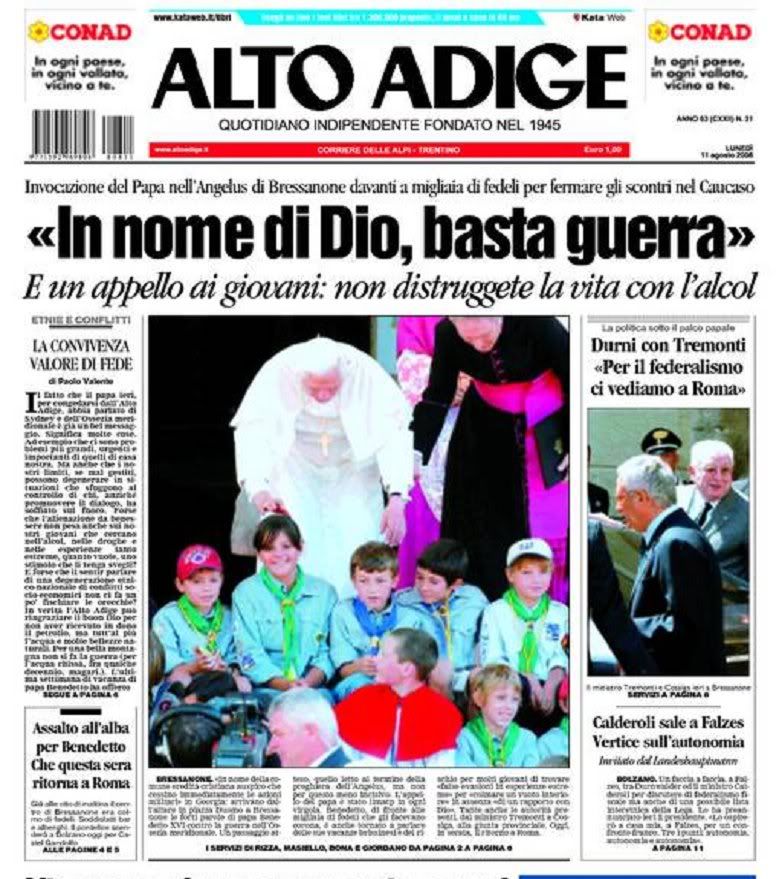
 A couple more photos out of sequence:
A couple more photos out of sequence:
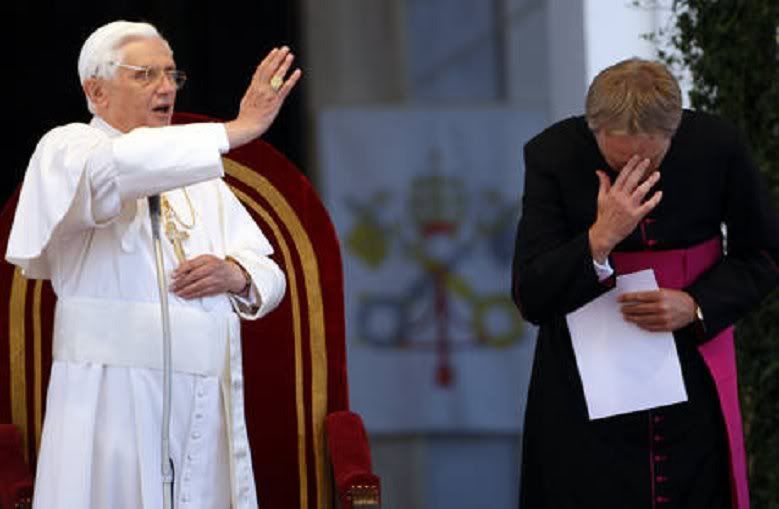 At the Angelus on 8/10.
At the Angelus on 8/10.
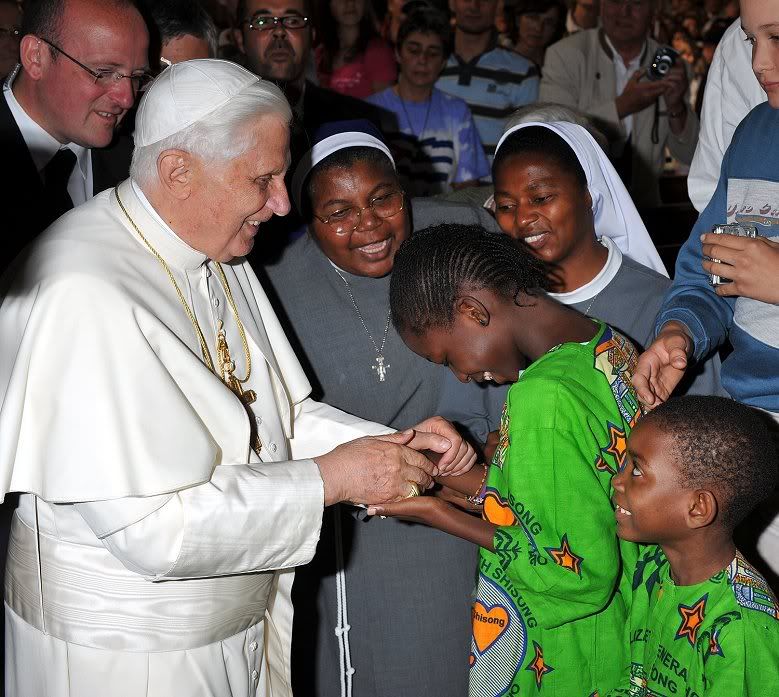 Either from after the 8/10 Angelus, or after the meeting with the clergy on 8/6.
Either from after the 8/10 Angelus, or after the meeting with the clergy on 8/6.
[Modificato da TERESA BENEDETTA 12/08/2008 04:41] |
 11/08/2008 21:21 11/08/2008 21:21 |
|
| | | OFFLINE | | Post: 14.611 | Registrato il: 28/08/2005
| Utente Gold | |
|
 Pope will say farewell
Pope will say farewell
from seminary window

BRESSANONE, August 11 (Translated from ASCA) - Just a few more hours in Bressanone, then Benedict XVI leaves for Castel Gandolfo at 5 p.m. today, but not before first saying his farewell to the city from the window that looks out on the piazza in front of the Seminario Maggiore which has hosted him for the past 15 days.
"Bressanone has an important place in his magisterium and his theological and pastoral commitment," Bishop Wilhelm Egger said Saturday when the city conferred honorary citizenship on the Pope. The bishop referrd to the fact that both the 1985 Rapporto sulla Fede (The Ratzinger Report) on the satte of the post-Conciliar Church, and the first four chapters of JESUS OF NAZARETH were written at the seminary.
Egger, bishop of Bolzano-Bressanone, has been the Pope's diocesan host and will be travelling with him from Bressanone to the airport in Bolzano, where the Papal flight will take off for Rome.
He will certainly express the wish to have the Pope back in Bressanone next year. "God willing," the Pope has answered to all who have asked him about this.
"Here I have been able to rest in the way best indicated for a minister of God," the Pope said during his Angelus message on Sunday, "dedicating myself to prayer, reading and meditation, without being constantly worried by daily pastoral concerns".
"I do not mean that I have forgotten them, of course, but that I have been able, so to speak, to filter them through a salutary detachment which helps to put them in the right perspective - to recognize that God is the Lord, and we are only his humble collaborators in the service of the Church and for the good of mankind."
This morning, the Pope met with law-and-order personnel to thank them for their protective hospitality. Hundreds of city and state police, finance agents and forest rangers gathered at the Seminary.

"It is only now that I realize," the Holy Father said with a smile, "how large is the army of guardian angels who have watched over me during this vacation."
The warm affection of the city, of which the Pope is now an honorary citizen, will certainly be evident once again this afternoon.
"Let us give the Holy Father a send-off with the same warmth that we welcomed him on July 28," Bishop Egger said.
At 5 p.m., he said, the Pope will appear at the window of the seminary's baroque library to say some words to the faithful.
ASCA'S bulletin of the Pope's departure:
'Like all things beautiful,
these days have come to an end'
Almost reluctantly, Benedict XVI bade farewell to Bressanone this afternoon, saying "Like all things beautiful, these days have come to an end, but I am carrying with me a treasure of memories. Auf wiedersehen!"
With that, he got into a car, accompanied by Bishop Wilhelm Egger, to proceed to Bolzano for the flight back to Rome after a 15-day vacation.
Additional information from
 :
The Brissinesi like to think that the Pope's 'Auf wiedersehen' means he expects to come back to Bressanone.
Mons. Egger told newsmen earlier:
"The Holy Father has really enjoyed his vacation here. He was able to do what he wanted to do: to stay home and pray, read, study, take walks in the garden. He spent the days largely 'in retreat', really, except for a few meetings with old friends."
The bishop said the Pope was so pleased at having the seminary gardens for his daily walks that he commented, "This is not just a garden - it's a park worthy of the Queen of England."
Besides the two Angelus prayers he led at the Cathedral on August 3 and 10, the Pope had only one other public event - the visit to Oies, birthplace of St. Joseph Freinademetz.
He made only one private excursion outside the seminary - a visit to the nearby village of Sant'Andrea, where he and his brother visited the tomb of a missionary friend who died in 2003.
In addition, he had a closed-door encounter with the clergy of the diocese last Wednesday, and there was the conferment of honorary citizenship which was a private ceremony held in the Seminary.
The Pope's previous summer vacations in Les Combes and Lorenzago di Cadore saw him take frequent brief excursions in the vicinity, and on his first summer in Les Combes, Val D'Aosta, in 2005, he went up to Mont Blanc, Europe's highest peak, which is located some 35-40 kms from Les Combes.
Very notably, unless it was done strictly in private during this 150-day vacation in Bressanone, he did not visit Rio di Pusteria/Muehlbach, a town 10-15 km north of Bressanone where his maternal grandparents are buried.
AUF WIEDERSEHEN, BRIXEN!

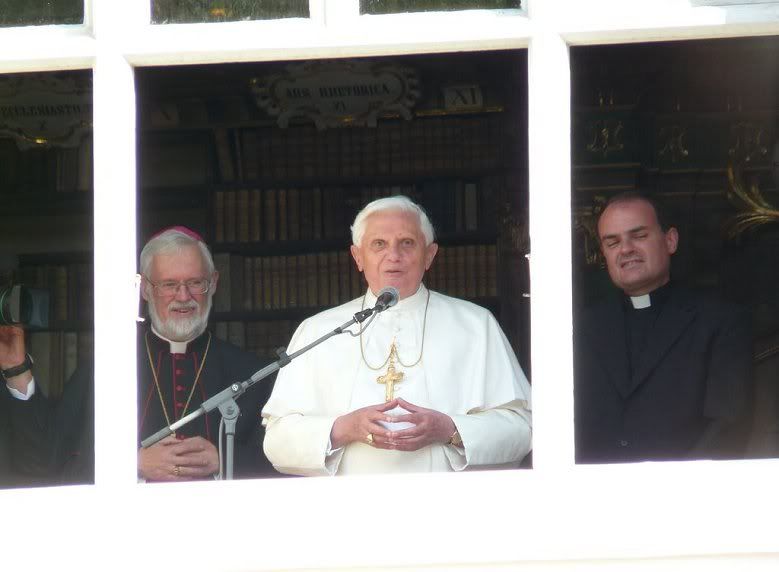 I've taken the liberty to use this excellent photo taken by Simone of Papa's farewell.... I've taken the liberty to use this excellent photo taken by Simone of Papa's farewell....
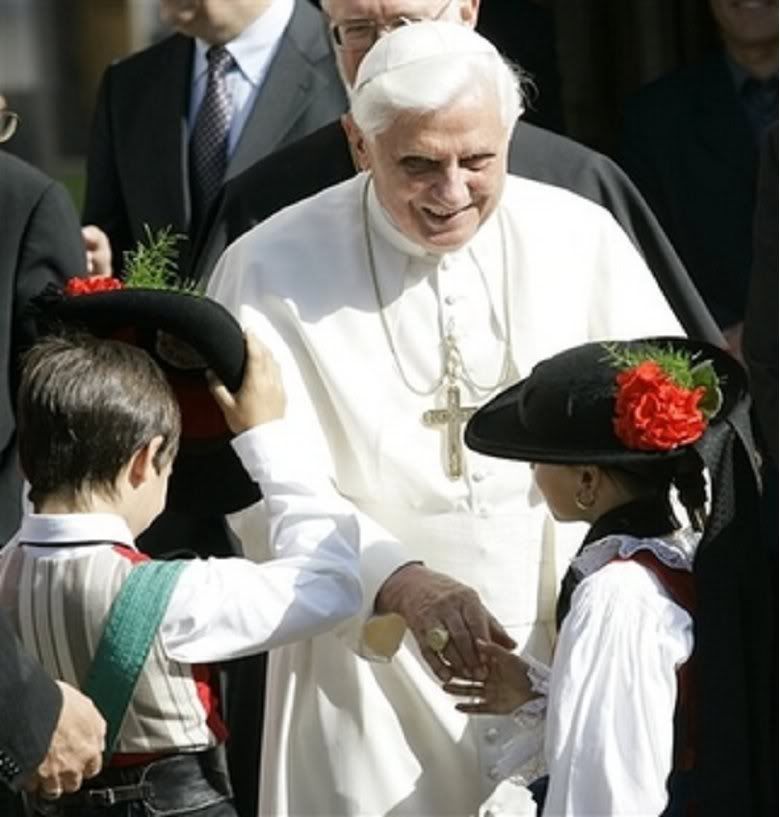
[Modificato da TERESA BENEDETTA 12/08/2008 05:46] |
 12/08/2008 13:59 12/08/2008 13:59 |
|
| | | OFFLINE | | Post: 14.615 | Registrato il: 28/08/2005
| Utente Gold | |
|

There have been no photos so far nor any stories, but the Holy Father is presumably safe and well-rested and in Castel Gandolfo, where he resumes his summer schedule.
Tomorrow, August 13, he will hold his Wednesday catechesis from the inner courtyard of the Apostolic Palace in Castel Gandolfo.
Friday, August 15, he will celebrate Holy Mass for the Solemnity of the Assumption at 8 a.m. in the parish church of St. Thomas Villanova in Castel Gandolfo, and at noon, will lead the Angelus from the Apostolic Palace.
He has two trips coming up soon - a pastoral visit to Cagliari, capital of the island-region of Sardinia, on Sept. 7; and an apostolic voyage to Paris and Lourdes on Sept 12-15. The latter will be his last international trip for 2008.
He has one other pastoral visit in Italy scheduled this year - to the Shrine of Our Lady of the Rosary in Pompeii on October 19.

8/13/08
Here is a brief snippet that ends an item in today's L'Osservatore Romano which was a sort of winding down of Holy Father's vacation. It's the only report I have seen so far of the Pope's actual return to Rome - and it's official. But no photos!
The Pope returns
to Castel Gandolfo
Translated from
the 8/13/08 issue of

...The Pope left the seminary by car at 5 p.m. for the airport in Bolzano. Seen off by a small crowd of faithful, he left for Ciampino airport in Rome on board an airplane of the Italian Military Aeronautics, along with Mons. James M. Harvey, Prefect of the Pontifical Household, and Monsignors Georg Ratzinger and Georg Gaenswein.
Those who saw him off at Bolzano were the bishop (Mons. Wilhelm Egger); the president of the provincial council Luis durnwalder; Bolzano Mayor Luigi Spagnolo, Commissioner Fulvio Testi rerpesenting the Italian govenment, and the airport manager.
In Ciampino, the Pope was welcomed by the undersecretary of the Italian Council of Ministers Gianni Letta.
The Pope then proceeded by car to the summer residence in Castel Gandolfo where he was welcomed by Vatican Secretary of State, Cardinal Tarcisio Bertone; the secretary-general of the Vatican Governatorate Mons. Renato Boccardo; Mons. Marcello Semeraro, Bishop fo Albano (diocese to which Castel Gandolfo belongs); and the director of the Pontifical Villas, Saverio Petrillo.
Starting today, August 13, the general audiences will resume and will take place at the inner couteryard of the Pontifical Palace in Castel Gandolfo.
[Modificato da TERESA BENEDETTA 13/08/2008 15:15] |
 12/08/2008 14:55 12/08/2008 14:55 |
|
| | | OFFLINE | | Post: 80 | Registrato il: 16/07/2007
| Utente Junior | |
|
He's also going to Sardinia in September.
* * * * * * * * * * * * * * * * * * * * * * * * * * * * * * * * * * * * * * * * * * * * * * * * * * * * * * *
Thank you, that was mentioned above.
TERESA
[Modificato da TERESA BENEDETTA 12/08/2008 16:01] |
 13/08/2008 14:00 13/08/2008 14:00 |
|
| | | OFFLINE | Post: 1.496 | Registrato il: 27/11/2005
| Utente Veteran | |
|
Was there a General Audience today? I came home from Rosary and switched EWTN on at once - only to find that the July 2nd GA was being encored. I rushed to the computer - couldn't get any information. I'm sure there was a bulletin stating that audiences would begin again on August 13th. I assumed this meant the GA would be in Saint Peter's Square or Paul VI Hall, as usual.
I'm chust waiting for some photos to appear on Yahoo News......
Every Wednesday I come home and switch on and if the audience is showing live then I know that he [now who on earth could that be? ![[SM=g27821]](https://im0.freeforumzone.it/up/0/21/4173150.gif) ] is all right.

Phew! All is well. I'm glad he didn't have to go to the Vatican, but surely it's very unusual to hold the General Audience at Gastel Gandolfo? I know Teresa mentioned above that the catechesis would be there, but I wondered if it was just the Angelus, as on Sundays. [Modificato da maryjos 13/08/2008 14:29] |
 13/08/2008 16:18 13/08/2008 16:18 |
|
| | | OFFLINE | | Post: 14.621 | Registrato il: 28/08/2005
| Utente Gold | |
|
RESERVED FOR WIND-DOWN STORIES OF BRESSANONE
[Modificato da TERESA BENEDETTA 13/08/2008 16:19] |
 13/08/2008 16:19 13/08/2008 16:19 |
|
| | | OFFLINE | | Post: 14.622 | Registrato il: 28/08/2005
| Utente Gold | |
|
 GENERAL AUDIENCE TODAY
A full translation of the Holy Father's words today has been posted in
GENERAL AUDIENCE TODAY
A full translation of the Holy Father's words today has been posted in AUDIENCE & ANGELUS TEXTS.
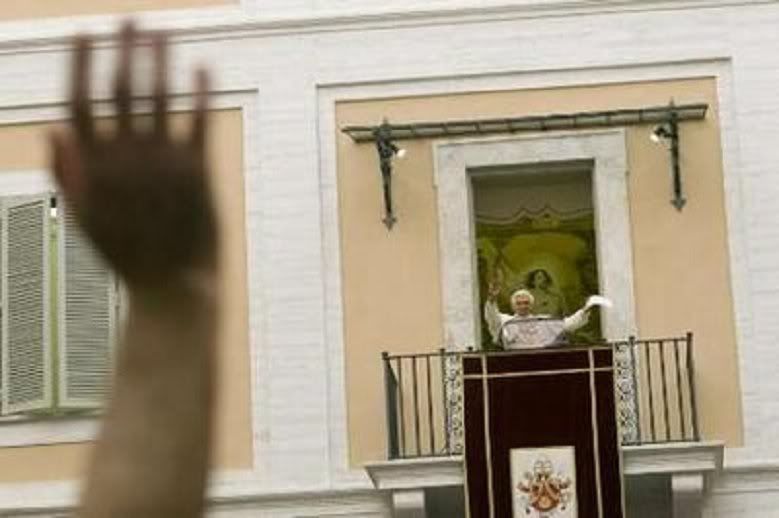
The Holy Father had an abbreviated General Audience today, addressing the faithful from the balcony overlooking the inner courtyard of the Apostolic Palace at Castel Gandolfo.
More than 4,000 pilgrims turned up for the catechesis.
Referring to the many letters he receives from the faithful asking for his prayers and confiding in him their problems and their hopes, the Pope assured everyone that he remembers them in his prayers, "especially in celebrating the Holy Mass and in reciting the Rosary".
"I know that the first service I can render to the Church and to mankind is prayer, because in praying, I confidently place in the hands of the Lord the ministry that he has entrusted to me, along with the destinies of the entire ecclesial and civilian community."
Underscoring the importance of prayer in the life of every person, he cited the example of the saints, then proceeded to speak about Saints Teresa Benedicta of the Cross (Edith Stein) and Maximilian Kolbe, both of whom were martyred in Auschwitz by the Nazis. Their annual feast days are celebrated on August 9 and August 14, respectively.
His catechesis was the length of his usual Angelus messages. Before the Pope left for Sydney, he had opened a new catechetical cycle on St. Paul.
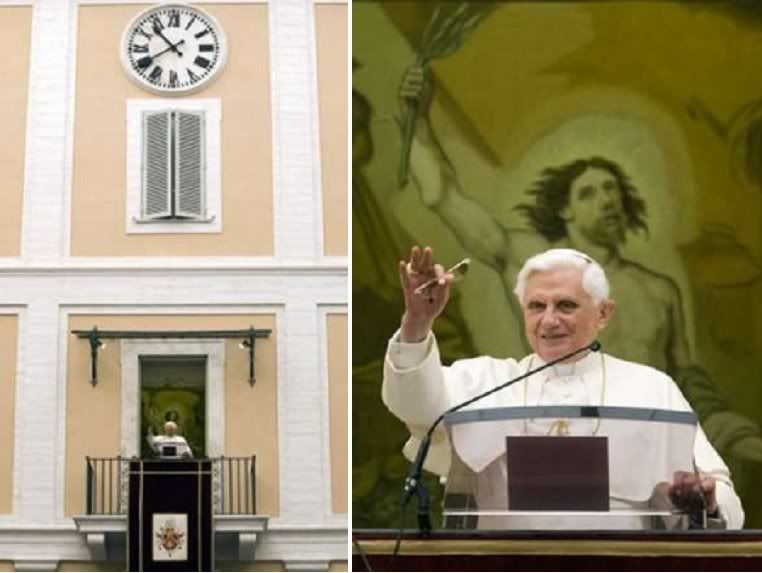
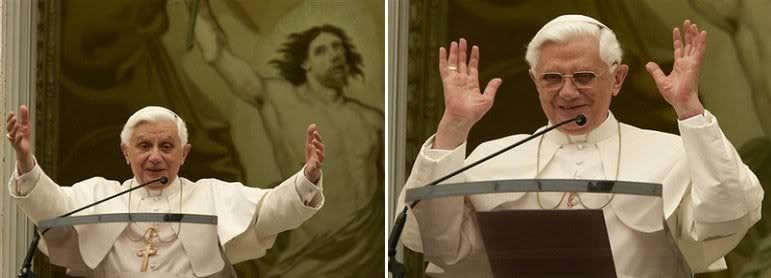
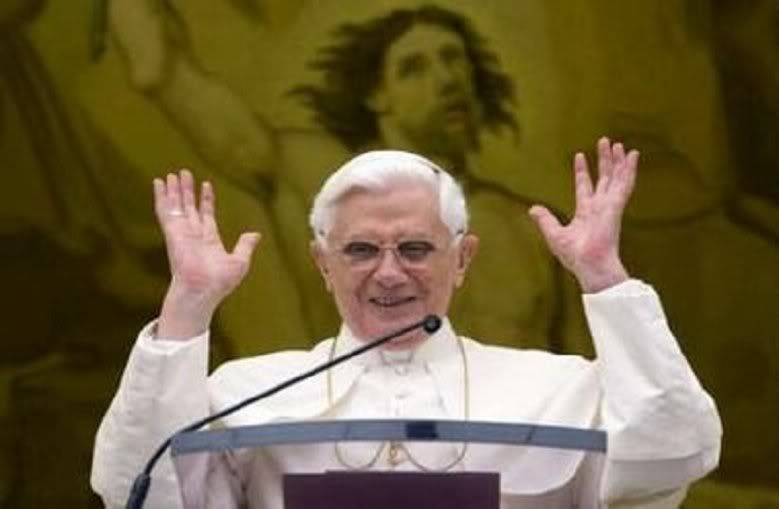
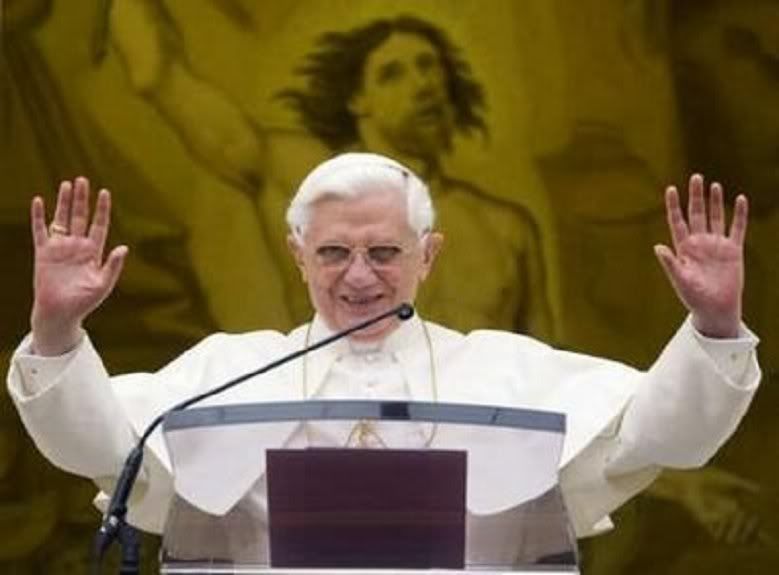 The set-up at Castel Gandolfo obviously does not allow for the Pope to be seated when giving the catechesis, and he cannot speak at length standing.
The set-up at Castel Gandolfo obviously does not allow for the Pope to be seated when giving the catechesis, and he cannot speak at length standing.
Lella on her blog reminds us that Benedict XVI held a GA at Castel Gandolfo once before, on August 18, 2005, shortly before leaving for World Youth Day in Cologne (he commented on Psalm 125, having devoted the first weeks of his Wednesday audiences to finishing the catechetical cycle on the Psalms that had been started by John Paul II); and that John Paul II himself held quite a few summer GA's in Castel Gandolfo.
[Modificato da TERESA BENEDETTA 17/08/2008 08:52] |
 13/08/2008 22:12 13/08/2008 22:12 |
|
| | | OFFLINE | Post: 1.497 | Registrato il: 27/11/2005
| Utente Veteran | |
|
|
 15/08/2008 06:02 15/08/2008 06:02 |
|
| | | OFFLINE | Post: 3.273 | Registrato il: 23/11/2005
| Utente Master | |
|
I guess news about Papa is so very scarce these days and he hasn't said anything lately that anybody could possibly take the slightest offense at so the professional complainers are reaching back to the ermine issue. I guess that that little ermine-trimmed cape Papa occasionally wears in winter, that probably required only about 2/3 of an ermine which probably died of natural causes, has upset some people out of their minds. The way they talk, they must believe that Papa is sending out numerous groups of huntsmen to viciously torture and slay thousands of ermines for his clothing. I guess they would prefer that he wear polyester. Here's the latest:
Italian animal rights group urges pope to stop wearing animal fur
By Cindy Wooden
Catholic News Service
ROME (CNS) -- Although Pope Benedict XVI does not wear fur-trimmed accessories in the summer, an Italian animal rights group launched a summertime petition drive asking the pope to stop wearing animal fur year-round.
Lorenzo Croce, president of the Italian Association for the Defense of Animals and the Environment, posted his petition online July 21 and had collected more than 2,900 signatures by the morning of Aug. 14.
The petition says the ermine-trimmed accessories Pope Benedict has worn -- the red, fur-trimmed "camauro" cap he wore briefly [ thank God] in 2005 and the fur-trimmed capes he regularly wears in the winter and early spring -- "have nothing to do with sacred vestments."
"With respect for life in all its forms and to remember that animals also are creatures of God," the petition asks the pope to act.
It also says animals "have a right to live" and that they feel fear and pain "when they are killed to satisfy human greed in all its forms."
Those signing the online petition are able to leave comments.
Pierangelo Sassone said the church teaches people to care for the defenseless and to be humble; "if the pope is cold, he can put on a wool coat."
Rafael Avila wrote, "What would the poor St. Francis of Assisi say?"
Cristina Gaiardelli said, "I hope that in this case, too, the pope will translate (his teaching on safeguarding creation) into facts and gestures."
Croce told reporters he would send his petition and the signatures to the Vatican in September.
In April 2007, after a well-known Italian fur-coat designer announced she would present the pope with a new cape made of ermine pelts, the Italian Anti-Vivisection League publicly asked the pope to stop wearing fur.
In June the Vatican newspaper L'Osservatore Romano published an article saying that ornate papal vestments are meant to symbolize the spiritual transformation of the person wearing the clothes, not his love of fashion.
********************
Pope makes fur fly over revival of ermine robes
Tom Kington in Rome
The Guardian
Thursday August 14 2008
Pope Benedict's fondness for fur trim on his hats and capes has come under fire from an Italian animal rights group, which has launched an online petition to persuade the pontiff to switch to synthetics.
Benedict has taken a traditional approach to papal formal wear to match his conservative views on liturgy and theology, reviving the camauro, an ermine-trimmed red velvet hat favoured by 17th-century popes and last worn by Pope John XXIII in the 1960s, as well as donning a cape trimmed with ermine, which is the white winter coat of the stoat.
But his use of ermine, long favoured by kings, judges and nobles, has drawn the ire of the Italian Association for the Defence of Animals and the Environment, which had by yesterday gathered 2,260 signatures for its petition. "The pope has often talked about protecting the environment and we are asking that he acknowledges that animals, as God's creation, also deserve respect," said the organisation's head, Lorenzo Croce.
Benedict's use of fur was defended yesterday by Cardinal Andrea Cordero Lanza di Montezemolo. "Aren't there more important battles to wage?" he asked. "There are human beings who merit more urgent assistance that no one is taking care of. And if we eat animals, we can wear them."
Animal lovers signing the petition may be hoping that a pope known for his fondness for cats may eventually extend his love of animals to stoats and weasels.
In an interview in 2000, before becoming pope, Benedict said he opposed factory farming and the fattening of geese to make foie gras. "Animals too are God's creatures," he said, "creatures we must respect as companions in creation and as important elements in creation."
**********************
Next…Bring Back the Ostrich Plumes!
Hugh McNichol in All News
Posted on August 14th, 2008
Pope Benedict XVI even during the annual summer holiday seems to always irk some activists. Now the latest issue concerns the animal rights of the mustela erminea more commonly called the stoat or short-tailed weasel. The winter fur of this small mammal has traditionally been used in the attire for monarchs, judges and civil officials throughout most of history from the Roman era until the present day. In the case of Benedict XVI, his winter mozetta and the Easter mozetta (recently revived after a 40-year hiatus) are under attack, as well as the camauro, which is an ermine trimmed hat worn in colder months. The camauro also has not been out of the papal closet since John XXIII. Benedict has also restored its usage during the Roman winters!
Italian animal rights activists have appealed to the Holy Father’s feline affections and asked him to no longer wear the fur of the prolific stoat, which populates most of Northern Europe and the Northern reaches of the Americas. The activists consider the use of the fur as cruelty to the diminutive animal and ask that fur no longer be used to embellish papal garments.
Traditionally the fur taken from this animal is used to accent ceremonial garments from all aspects of nobility and courtly life. The snow-white fur that the animal adapts during the winter season is traditionally considered as a symbol of purity. Judges in European courts have worn the fur for centuries as a sign of their objective purity in terms of the administration of justice, monarchs have worn it to symbolize their Divine right of monarchial succession, and Popes have worn it to indicate the Church’s ongoing mission to bring about purity to mankind with eternal salvation.
To set the record straight, the animal is not endangered anywhere in the world. Use of the animal’s soft and snow-white fur does not present an ecological or environmental catastrophe in the making. The inclination to appeal to the Pope’s kindly disposition towards felines doe not offer a legitimate or logical argument towards prohibiting the Pope to wear the ermine trim on his garments. Most importantly, many issues that are more serious need the attention of the Holy Father besides the disposition of a few furs from an animal that is not endangered, nor on the verge of extinction.
The Holy Father has consistently shown an appreciation for the environment and the potential dangers of global warming. While he has not publically state his animal rights stance, I am quite sure Benedict has no conspiratorial campaign against the short-tailed weasel that has such a fashionable winter pelt.
The papal wardrobe consists of pieces that have also been handed down from his predecessors. Perhaps, the mozetta that the Pope is wearing is part of a previous Pope’s collection of ceremonial vestments. Is it really necessary for the Pope to issue a disclaimer that; “No animals were harmed in the making of this garment!” If indeed this is the case, then there also needs to be a disclaimer attached to every product that contains natural silk, which also destroys the silk worm in the manufacturing process.
While modern individuals in some cases discourage the use of animal furs and hides in the making of clothing and other accessories, this does not seem to be a legitimate example that requires a papal response. If indeed there was an exploitation of the stoat that endangered its very survival, then perhaps a discussion is warranted.
Viva il Papa Benedict XVI! Ad multos annos!
Hugh McNichol is a Catholic author and journalist that writes on Catholic topics and issues. Hugh studied both philosophy and theology at Saint Charles Borromeo Seminary in Philadelphia. He writes daily at: verbumcarofactumest.blogspot.com & catholicsacredarts.com & pewsitter.com He writes about Irish Catholic experiences at graysferrygrapevine.blogspot.com Comments are always welcome @ hugh.mcnichol@trinettc.com
[Modificato da benefan 15/08/2008 15:34] |
 15/08/2008 15:43 15/08/2008 15:43 |
|
| | | OFFLINE | Post: 3.274 | Registrato il: 23/11/2005
| Utente Master | |
|
Heaven is God, not an imaginary place, Pope Benedict says
By Catholic News Service
August 15, 2008
CASTEL GANDOLFO, Italy (CNS) -- Heaven is not an abstract idea or an imaginary place, but heaven is God, Pope Benedict XVI said.
Celebrating an early morning Mass Aug. 15, the pope said the feast of the Assumption of the Blessed Virgin Mary "urges us to raise our gaze toward heaven, not a heaven of abstract ideas nor an imaginary heaven created in art, but the true reality of heaven which is God himself. God is heaven."
During the Mass in the small parish Church of St. Thomas, located on the main square in Castel Gandolfo, the pope said that while Mary's assumption is "totally unique and extraordinary," it also assures believers that their destiny, like hers, is to be with God forever.
God is "our goal, he is the dwelling place from which we came and toward which we are called," the pope told about 200 people who had crowded into the church, while hundreds of others watched on a large screen erected in the square.
"We are all children of God the father, brothers and sisters of Jesus, children of our mother Mary," the pope said. "And all of us want happiness, and that happiness is found in God."
Pope Benedict said Mary, as the loving mother of her son's followers, "helps us, encourages us so that every moment of our existence would be a step in this journey toward God."
"Gazing at Mary, assumed into heaven, we understand better that our everyday lives -- although marked by problems and difficulties -- flow like a river toward the divine ocean, toward the fullness of joy and peace," he said.
The pope said that in a world marked by "the sad spectacle of so much false joy and, at the same time, so much agonizing pain," Christians must learn to be like Mary, "signs of hope and consolation."
At midday, Pope Benedict recited the Angelus with visitors gathered in the courtyard of the papal summer villa.

He said that while the last mention of Mary in the Bible places her with the apostles awaiting the Holy Spirit on the day of Pentecost, the church teaches that she was taken, body and soul, "from the earth to heaven."
"This firm conviction of the church found its coronation in the dogmatic definition of the Assumption pronounced by my venerable predecessor Pius XII in the year 1950," he said.
"From paradise, the Blessed Mother continues always, especially in difficult hours of trial, to watch over her children, whom Jesus himself entrusted to her before dying on the cross," the pope said.
Pope Benedict said the hundreds of Marian shrines around the world testify to the fact that millions of Christians have and continue to experience her maternal love.
The pope specifically mentioned the Shrine of Our Lady of Lourdes, which he will visit during a Sept. 12-15 trip to France.
"Mary assumed into heaven indicates to us the ultimate aim of our earthly pilgrimage," he said.
"She reminds us that our whole being -- spirit, soul and body -- is destined for the fullness of life, that one who lives and dies in love for God and for one's neighbor will be transfigured into the image of the glorious body of the risen Lord, that the Lord casts down the mighty and raises up the humble," the pope said.

[Modificato da benefan 16/08/2008 02:56] |
 15/08/2008 17:16 15/08/2008 17:16 |
|
| | | OFFLINE | Post: 1.503 | Registrato il: 27/11/2005
| Utente Veteran | |
|
Thank you for the transcript of Papa's homily, benefan.
I watched most of the Mass on my computer, but was also getting ready to go to our own Mass, so I missed parts of it. It's a shame that EWTN doesn't show this particular Mass. I love that church. At the risk of becoming a bore !!!!!! I was extraordinary minister there during our pilgrimage Mass in September 2005, so it's special to me. It meant a lot to me, though I don't suppose it was that amazing. |
 15/08/2008 20:47 15/08/2008 20:47 |
|
| | | OFFLINE | Post: 3.275 | Registrato il: 23/11/2005
| Utente Master | |
|
Pope invites Lutheran theologians to discussion about Jesus
By Catholic News Service
August 15, 2008
ROME (CNS) -- As Pope Benedict XVI continues work on the second volume of his book about Jesus of Nazareth, he has asked two Lutheran theologians and some of his former students to discuss with him issues he will be writing about.
Martin Hengel and Peter Stuhlmacher, both retired professors of New Testament studies from the Protestant theology faculty at the University of Tubingen, Germany, said they have been invited to lecture Aug. 30 at the meeting at the pope's summer residence in Castel Gandolfo, south of Rome.
The Aug. 29-31 meeting is the annual gathering of the pope's former doctoral students, known as a "schulerkreis" (student circle). Cardinal Joseph Ratzinger, now Pope Benedict, began the annual meetings with his former students in 1978.
Hengel told Catholic News Service in Rome Aug. 12 that although he was having health problems he hoped to attend the meeting in Castel Gandolfo. He already has sent participants an outline of his talk, which he titled "Questions About the Historical Jesus of Nazareth: Considerations After Writing a Book on Jesus."
In 2007, Hengel's book, "Jesus and Judaism" was published in Germany.
Stuhlmacher told CNS his task will be to "try to demonstrate how Jesus himself understood his passion and death."
The two scholars are referred to often -- with both positive comments and critical observations -- in the first volume of the pope's book, "Jesus of Nazareth: From the Baptism in the Jordan to the Transfiguration."
The 400-page book, published in April 2007, highlights what the Bible says about Jesus, what the moral implications of his teachings are and how reading the Scriptures can lead to a real relationship with Jesus.
During Pope Benedict's 2007 summer vacation and again this year when he headed to the mountains of northern Italy in late July, he was working on the second volume of the book, said Jesuit Father Federico Lombardi, papal spokesman.
The volume is expected to cover the end of Jesus' public ministry, his passion, death and resurrection.
|
 15/08/2008 21:11 15/08/2008 21:11 |
|
| | | OFFLINE | Post: 3.276 | Registrato il: 23/11/2005
| Utente Master | |
|
A round of questions for the 'shepherd-in-chief'
by John L. Allen, Jr.
All Things Catholic
Friday, August 15, 2008 - Vol. 7, No. 47
Anyone who's ever learned a foreign language knows that perhaps 50 percent of a language is predictable according to its own rules, and the rest simply is what it is, the product of history and culture rather than logic. Try explaining to an ESL student why the plural of "mouse" is "mice," but the plural of "spouse" is not "spice," and you'll find that going over the rules really doesn't help; in the end, that's just how things are.
Much the same point applies to the inner life of the Catholic church. Maybe half of it flows rationally enough from theology and canon law, but the rest can be difficult to grasp in terms of strict logic. Last week brought a fresh reminder of the point, in the form of Pope Benedict XVI's 90-minute Q&A with priests in northern Italy.
The Vatican released a transcript of the pope's remarks last Friday, and I've posted a translation here: ncrcafe.org/node/2039 [1]. In keeping with local custom, two-thirds of the event was in German, one-third in Italian.
Logically speaking, there's no particular reason why the clergy of obscure dioceses in the Alps ought to be proxies for Catholics everywhere in the pope's most substantive annual exchange on the state of the faith. The Alto Adige region of northern Italy just happens to be, however, where Benedict XVI takes his summer vacation, and he's adopted the custom of sitting down with local pastors during his break. These are wide-ranging and remarkably candid conversations, basically the only regular occasion where the rank-and-file has the chance to put questions to the shepherd-in-chief.
To be sure, this is not the prime minister facing back-benchers in the House of Commons. Prior to Benedict's encounter on Aug. 6 in Bressanone, the local bishop, a Capuchin by the name of Wilhelm Emil Egger, asked his priests, deacons and seminarians to submit proposed questions for the pope. Egger then chose six questions -- attempting, according to Vatican spokesperson Fr. Federico Lombardi, to pick themes that drew the most interest and that also responded to the different backgrounds of the participants. Egger passed the questions on to Benedict in advance, giving the pope time to think about what he wanted to say. (For the record, this is basically the same procedure employed for press conferences aboard the papal plane.)
In other words, these are not really unscripted affairs; the pope has advance knowledge of the topics, and theoretically could avoid any question he doesn't want to take. That said, the sessions nevertheless offer a rare opportunity to probe the pope's mind on matters of keen interest at the grass roots.
I'll offer four highlights from this year's edition.
Benedict and the Environment
Generally the questions in these get-togethers come from pastors out in the trenches. This time, however, Benedict also decided to take one from an activist and theologian: Fr. Karl Golser, who directs the Institute for Justice, Peace and Care of Creation in Bressanone. A former official of the Congregation for the Doctrine of the Faith during the early years of then-Cardinal Joseph Ratzinger's tenure, Golser publishes and speaks widely on environmental topics.
Setting up his query, Golser asserted that too many believers fail to see a connection between their faith and questions such as climate change or pollution. He then asked Benedict what can be done to bring these matters more into the Christian mainstream. Given the controlled nature of the event, the pope's decision to take the question in the first place was, in effect, one way of responding to that concern.
Benedict minced no words in condemning what he termed the "brutal consumption of creation," and he called for an urgent renewal of the theology of creation. Beyond that, Benedict made four points that, together, could be said to represent the heart of his environmental message.
Biblical faith promotes respect for the environment, not indifference: Over the years, critics have often charged that the language of the Book of Genesis about humanity "subjugating" the earth has fostered ecological arrogance, a disastrous belief that human beings can do whatever they want with the planet. Instead, Benedict insisted, wherever the biblical vision has been taken seriously, people have clearly understood their role as custodians of creation rather than its master. As evidence, the pope pointed to monastic practices of gardening and cultivation; what grew up around monasteries, he said, were in fact "little paradises," "oases of creation," offering proof that the Biblical vision is one of "protection of creation, not destroying it."
The environmental movement needs God: What the natural environment most needs today, the pope argued, are people who "see it through God's eyes." Ultimately, it is only God who sets limits to the human lust for consumption and power. If matter is all that exists in the universe, why shouldn't we scramble to grab as much of it as possible? If this life is the only one, why shouldn't we milk every possible unit of pleasure out of it? The bottom line, according to Benedict, is this: "True and effective measures against the waste and destruction of creation can only be realized and developed, understood and lived, when creation is considered from the point of view of God." In that regard, Benedict said, it's important to hold the doctrines of creation and redemption, earthly life and eternal life, together.
Care for the earth is not just about policies, but lifestyles: The pope insisted that it's not only laws and business practices that have to change, but styles of life. "It's not just a question of finding techniques that can prevent environmental harms, even if it's important to find alternative sources of energy and so on," Benedict said. "All this won't be enough if we ourselves don't find a new style of life, a discipline which is made up in part of renunciations." In that regard, the pope argued, Christians should lead by example. Christians should offer proof through the simplicity of their own lives that they believe what they say, and that it's possible to be happy and fulfilled while living in ways that respect the inner dynamics of creation.
A "clear and decisive" public role: Today's widespread sensation that "the world may be slipping away -- because we ourselves are driving it away," Benedict said, creates an opportunity to present the faith in public as a "positive proposition." This is especially the case, Benedict said, where there is "already a sensibility" for the faith. The popular sense of being "oppressed by the problems of creation," Benedict suggested, creates a context in which people may be willing to take a new look at the Christian message, including its call to "a discipline of responsibility to the future and to others." Thus, the pope said, Christians have a "duty to intervene in a clear and decisive manner in public opinion."
Human Virtues and Evangelization
A seminarian named Michael Horrer, who had followed Benedict XVI to Australia for World Youth Day, asked the pope how to "exercise our mission as witnesses of Christ" back home among families, friends, and acquaintances.
In the first place, Benedict urged renewed commitment to the spiritual basics -- prayer, meditation on Scripture, the Eucharist, and the Sacrament of Penance.
Beyond that, the pope didn't dwell on specific evangelization strategies, but instead recommended the cultivation of simple human virtues. He offered several examples: "Honesty, joy, openness to listening to one's neighbor, the capacity to forgive, generosity, goodness, [and] cordiality." Such qualities, Benedict said, "are indicative of the fact that faith is truly present," and often represent the best form of witness.
In that regard, the pope told a brief story about a conversation he'd once had with the head of the Knights of Malta. One year at Christmas this official took a group of young people to Termini, the central train station in Rome, in order to spread some cheer among the poor and outcasts who tend to congregate there. As he was getting ready to leave, the official later told the pope, he heard one of the young people say, "This is better than the discothèque! Here it's truly beautiful, because I can do something for others."
Benedict suggested that the story provides a template for how successful witness often emerges, naturally and unscripted, through the effort to focus on others rather than oneself. Do that, the pope implied, and the rest will follow.
"A light will radiate out from us," the pope said, "without our having to think about it too much, without adopting a way of acting that's -- to put it this way -- 'propagandistic.' It will happen on its own, because it reflects our soul."
To use a bit of jargon that I've coined elsewhere, this comes across as a very "affirmative orthodoxy" recipe for evangelization. In today's debates over missionary strategy and what it means to be "evangelical," Benedict's suggestion is to focus in the first place on basic human decency -- goodness, as he puts it, "in the most ample sense of the term."
A collegial tone
Fr. Franz Pixner, a dean in the Bressanone diocese, asked the pope a sort of omnibus question. Starting from the premise that today's priests are stretched too thin, Pixner managed to wrap the issues of mandatory celibacy, the ordination of viri probati, the role of women in the church, and the use of lay people to administer baptisms and give homilies into a single 200-word query.
To be honest, Benedict didn't even try to respond to most points; instead, he restricted himself to a few words about striking the right balance between the singular role of the priest and appreciation for other charisms. In passing, he reaffirmed the value of priestly celibacy, saying that it provides a "great reminder" of the priest's total gift of himself to God and to others.
What was noteworthy was less the substance of the response than its spirit. Benedict readily conceded that the points raised by Pixner "worry pastors and all of us in this time," and stressed that "no one has a ready recipe" in terms of what to do. Rather than providing definitive answers, Benedict called for a "dialogue among ourselves, a responsible dialogue of the faith, in order to find the right path."
"We are all searching together," Benedict said. In that context, he said, his own remarks should be understood simply "as part of a much larger dialogue."
It's worth recalling that the pope was not caught off guard by the question. He knew in advance what was coming, and still replied in this decidedly non-oracular fashion. His intent seemed to be to invite, rather than to close, conversation.
Of course, what Benedict has in mind is not a dialogue without limits; his brief remarks are enough to suggest, for example, that a reconsideration of mandatory clerical celibacy is not in the cards. Nonetheless, Benedict's tone throughout the session was strikingly modest and collegial. Later, in response to another question, the pope jokingly said he couldn't supply an "infallible answer," but could only "respond based on what I see." When Golser asked his question about ecology, Benedict modestly began by saying, "You could certainly respond better than me."
In part, that tone reflects the personality of Benedict XVI, the humility which has charmed audiences in Rome and abroad. In part, however, it also is a deliberate ecclesial act, a choice to foster collegial conversation rather than settling every matter by diktat. It's a case in which a pope leads not only by what he says, but by how he says it - and by what he chooses not to say.
Mercy over Severity
The final question came from a local pastor named Fr. Paolo Rizzi, and it expressed a typical pastor's gripe: Too many kids these days, Rizzi complained, come forward for First Communion and Confirmation but don't show up at Mass on Sunday. Sometimes, he said, he's tempted to tell them, "Just stay home for all of it!" Rizzi asked the pope what pastoral strategy he would suggest.
In response, Benedict said that when he was a younger priest, he was "rather more severe," taking the position that if candidates didn't practice the faith on a regular basis, they shouldn't receive the sacraments. Today, however, he said he sees things a little differently.
"In the course of time, I have realized that we have to follow the example of the Lord, who was very open with people who were at the margins of Israel," he said. "If we can see even a tiny flame of desire for communion in the church … it seems right to me to be rather generous."
Naturally, Benedict said, when the faith is completely absent, administering the sacraments would be a sham. He described the phenomenon in terms any pastor will readily recognize: "Where there is no element of faith … First Communion would just be a party with a big lunch, nice clothes and nice gifts," the pope said.
At the same time, Benedict said, even small stirrings of the faith ought to be encouraged rather than snuffed out, and thus his instinct is usually to err on the side of mercy.
It would be a fascinating exercise to press Benedict XVI to reflect on how that preference for mercy over severity, yet always in respect of the faith, might be "cashed out" in other thorny pastoral situations - such as, for example, the vexed questions of communion for pro-choice politicians, or administering the sacraments to divorced and civilly remarried Catholics.
One hopes that priests in northern Italy, who will probably get another shot at quizzing the pope next year, are taking notes.
|
 16/08/2008 05:28 16/08/2008 05:28 |
|
| | | OFFLINE | Post: 3.278 | Registrato il: 23/11/2005
| Utente Master | |
|
Pilgrims flock to France for Papal visit
AAP
August 16, 2008
Some 200,000 pilgrims are expected to flock to the French shrine of Lourdes to attend a mass celebrated by Pope Benedict XVI on September 14, a French bishop says.
The head of the Roman Catholic Church will spend most of his September 12-15 visit to France in the southwestern town, one of the main Catholic pilgrimage sites which attracts some six million pilgrims each year.
The sanctuary at the foot of the Pyrenees mountains is this year celebrating the 150th anniversary of a series of visions of the Virgin Mary by a young French shepherdess.
French bishop Jacques Perrier was speaking to reporters following a mass celebrated in Lourdes by the archbishop of Paris Andre Vingt-trois.
The archbishop told reporters he also expected some 250,000 people to attend the pope's mass the Invalides esplanade in Paris on the morning of September 13.
|
 16/08/2008 18:56 16/08/2008 18:56 |
|
| | | OFFLINE | | Post: 14.631 | Registrato il: 28/08/2005
| Utente Gold | |
|
|
|
|
|
|